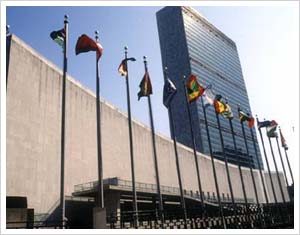World migration a boon for humanity, UN report says
 Bangkok - The world's 1 billion migrants are a boon to human development and further benefits could accrue from global migration with a lowering of barriers to internal and cross-border labour mobility, the United Nations said in a report released Monday.
Bangkok - The world's 1 billion migrants are a boon to human development and further benefits could accrue from global migration with a lowering of barriers to internal and cross-border labour mobility, the United Nations said in a report released Monday.
The United Nations Development Programme's Human Development Report 2009, released in Bangkok at a ceremony presided over by Thai Prime Minister Abhisit Vejjajiva, focused on the scarcely studied and often misunderstood phenomenon of migration.
Thailand, home to more than 3 million migrant workers and a notorious hub for human trafficking, made an appropriate launch pad for the report, said Jeni Klugman, chief author of the report.
"I think the situation in Thailand at the moment does illustrate some of the challenges as well as the importance of some of the points we're making, especially in terms of simplification of the procedures and reducing the costs (of migration) as much as possible," Klugman said.
The report, titled Overcoming barriers: Human mobility and development, broadly recommends that governments around the world facilitate labour migration, which generates about 300 billion dollars in remittances annually and provides an "aggregate benefit" economically for both supply and destination countries.
The study also pops some common myths about migration.
For instance, of the world's 1 billion migrants, it notes that 740 are internal migrants, who move within their own countries, and only 70 million are migrating from developing countries to developed ones.
"The movement from developing to developed countries is only a minority of international movement," Klugman said. "Only 1 per cent of people born in Africa end up living in Europe, for example."
The majority of international migrants, or about 200 million people, migrate from developing countries to other developing countries.
And it is often the poorest migrants, those employed at unskilled jobs, who are the most abused by existing migration practices and immigration systems.
"Under agreements between Thailand, Cambodia and the Lao People's Democratic Republic, recruitment fees are equivalent to 4-5 months' salary and 15 per cent of the wages are withheld pending the migrants return home," the report said.
"In contrast, smugglers in these corridors reportedly charge the equivalent of one month's salary," it added, noting that as a result only 26 per cent of migrant workers in Thailand were registered. Being unregistered opens migrants up to greater abuses by employers.
An Indonesian labourer working in Malaysia and Singapore will lose an average of six months' salary to "transaction costs," and an entire year's worth when working in Taiwan.
The exploitation of workers generally starts at home.
For instance, the UNDP report noted that in the Democratic Republic of Congo a passport can cost up to 500 dollars in bribes.
Besides calling for a lowering of barriers to migration, especially for unskilled labour, the report also calls for the provision of basic rights and services, such as education and health care, for immigrants.
It estimated that one-fifth of the economic benefits from migration accrue in the destination countries, "partly through taxes, which people pay, partly in terms of productivity and partly through innovations," Klugman said.
For source countries, the most obvious benefit is in terms of remittances sent home, however, remittances have been hit this year by the global recession.
"Remittances to developing countries are expected to fall from 308 billion dollars in 2008 to 293 billion in 2009," the report said.
In 2007, the volume of official remittance amounted to four times the size of total official development aid.
Generally speaking, populations are more open to migration when economies are good and jobs plentiful.
But the UNDP urged governments to think about the future in remodelling their migration practices.
"Following recovery from the global recession, demand for migrant workers will return, therefore it is short-sighted to negate benefits which migrants bring," Klugman said. (dpa)